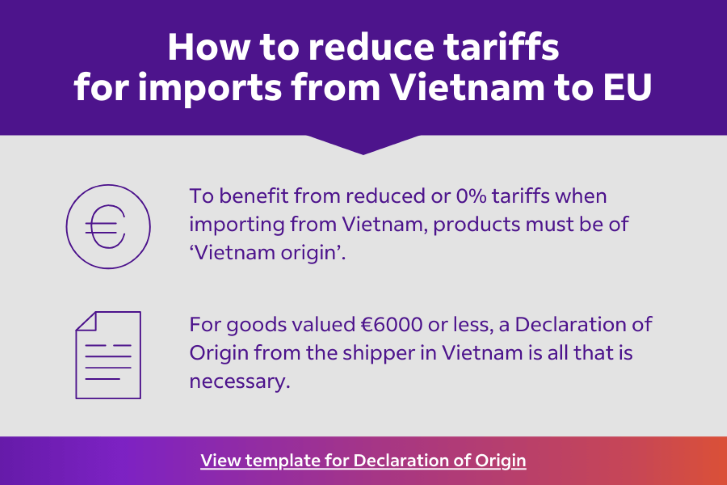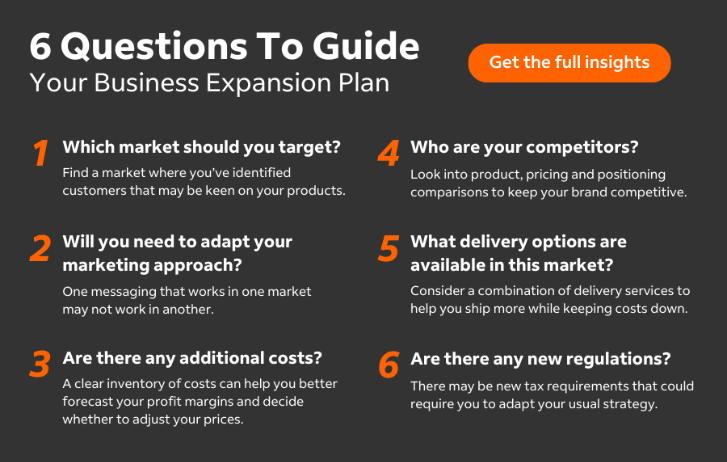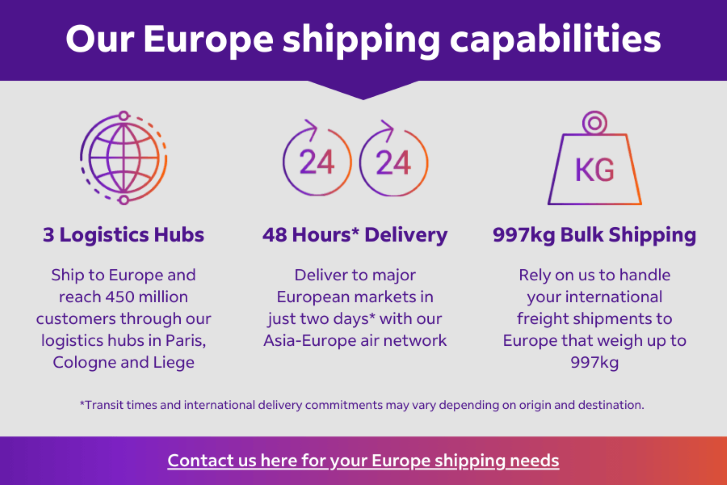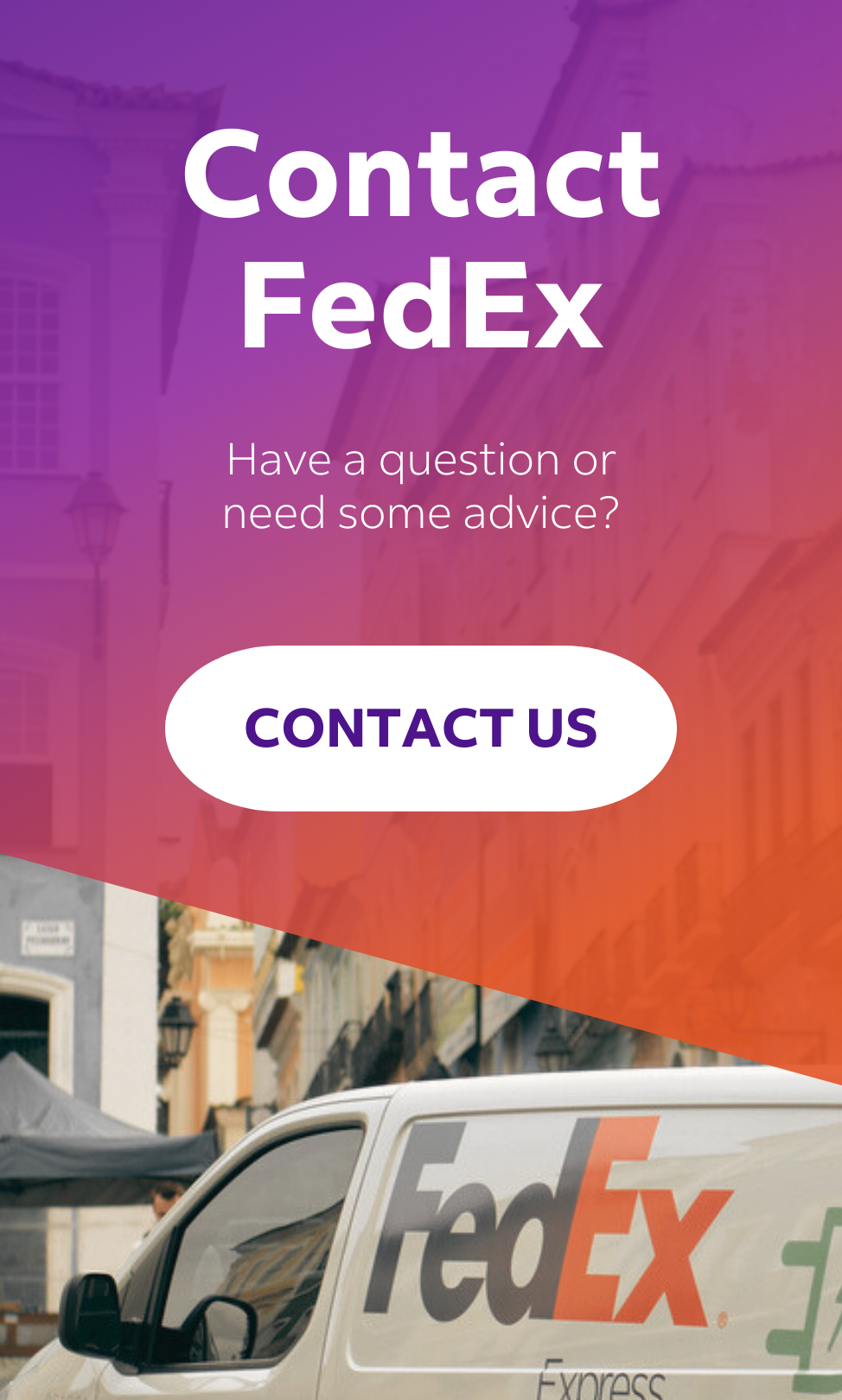
How Asian E-Tailers Can Reach New Customers In Europe
By FedEx | First published: December 15, 2023 Updated: March 5, 2024
Europe has a wealth of opportunities for Asian e-tailers with global ambitions. Here’s how your small business can take on the European market.
Today, it’s easier than ever for small businesses to take big steps on the world stage. The rise of e-commerce means retailers can reach new customers across borders in one click. At the same time, global logistics providers continue to simplify how we send goods around the world. The only question is: where do you want to take your business next?
If you’re a small business itching to go global, Europe offers rich opportunities to reach a larger customer base and accelerate business growth.
As ASEAN’s third-largest trading partner, the European Union (EU) – a group of 27 countries in Europe – has plenty of untapped potential: diverse markets, a growing appetite for online shopping, and a strong shipping network linking Europe to Asia.
Why entering the European market is a smart business move
With a population of 450 million, the EU offers a massive and diverse group of potential customers for SMEs seeking Asia-EU trade. What’s interesting about the EU is that it operates as a single market. Goods can move freely from one member state to another without customs duties or restrictions on quantity.
This means that once you establish your business in one country, you can easily move your products across borders and expand around the region. As a whole, Europe has also seen an e-commerce boom in recent years, and is now home to four of the 10 biggest e-commerce markets globally: the UK, Germany, France, and Spain.
Europe is home to four of the 10 biggest e-commerce markets in the world.
There’s potential for rich pickings for Asian e-tailers in a market that isn’t yet saturated – Europe’s e-commerce market is still set to grow by an annual average of 8% between 2023 and 2028. When it comes to shipping, you can count on a well-developed logistics infrastructure to get your goods to customers quickly.
At FedEx, for instance, our network can deliver from Asia to Europe’s major markets can deliver from Asia to Europe’s major markets in as fast as two days. Once there, small businesses can easily reach new customers by establishing partnerships with local distributors.
Why European businesses should import from Vietnam
For European importers, partnering with Asian businesses can be a win-win. Here are the strategic benefits of sourcing products from thriving manufacturing hubs like Vietnam:
Lower costs
Asia is home to many fast-growing manufacturing hubs with low production and labor costs. Case in point: Vietnam’s average labor costs are USD2.99 per hour – half that of China’s. This translates to lower-cost imports that can boost your bottom line.
Specialized products
Look to Asia for producers at the top of their game in various sectors. Singapore is becoming a global hotspot for plant-based proteins, while Vietnam is a world leader in garment and textile exports. Take a peek at the top five exports from Vietnam to Europe in 2022:
1. High-tech electronics (29.6K metric tons)
2. Personal and household goods (27.5K metric tons)
3. Fashion goods (24.2K metric tons)
4. Machinery parts and components (12.3K metric tons)
5. Raw materials, industrial consumables and food (9.8K metric tons)
Seamless shipping
Diversify your supply chain by importing from trade partners like Vietnam. Reliable shipping options between Vietnam and Europe – such as FedEx’s recently enhanced flight services – can help you stay agile and resilient.
Find out how to start importing and exporting from Vietnam here.
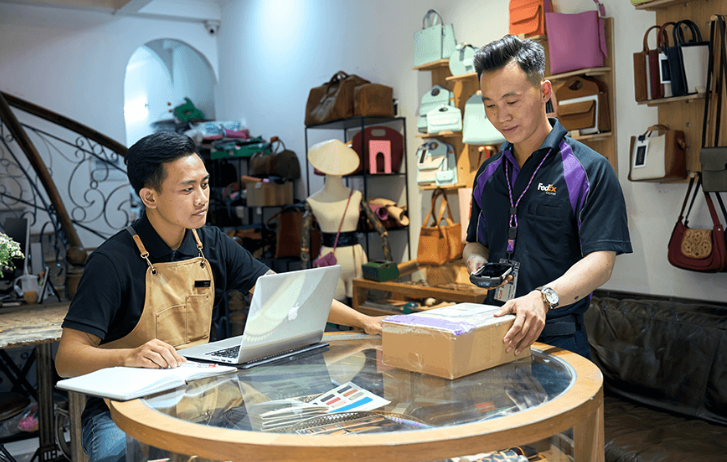


Keen to kickstart your cross-border Europe expansion? Here are four tips to help you create a winning market entry strategy:
1. Pick a strategic entry point
To pinpoint the right target market for your first foray into Europe, consider a few factors.
The first is language: what resources do you have to invest in localizing your content and user experience? If your brand is English-speaking, markets like the UK or Ireland offer a convenient starting point where English is the language of business.
Another consideration is the size of your industry’s e-commerce market. For instance, the UK is a hotbed for fashion e-tailers, clocking the region’s highest revenue for online fashion retail. Researching your industry’s fastest-growing online markets can give you clues for selecting your target export market.
Since your first European market can be a launchpad into the rest of the region, looking for a country with a strong logistics infrastructure can help you go far. For example, Germany is a popular hub for operations – it’s a top three intra-EU export partner for 24 EU countries.
2. Brush up on the regulations
The EU’s business regulations can vary significantly from those in Asia. Identify the key regulations that will impact how you do business in Europe, such as:
Consumer protection laws — The region has stringent measures on product safety and strong consumer rights. This includes the right to a minimum two-year guarantee on new goods bought at no extra cost, and the right to cancel orders and get a full refund within 14 days.
General Data Protection Regulation (GDPR) — Businesses need to demonstrate GDPR compliance by implementing data security measures, maintaining detailed documentation of the data you collect, and getting informed consent from data subjects.
Value-added tax (VAT) — While 15% is the EU’s minimum VAT rate, each member country has the freedom to set its own rate, which will impact your product pricing. Current rates range from 17% to 27%, depending on the country you choose to register your business in for VAT.
3. Understand local buying trends
What sells well in Asia might not do the same in Europe. Make sure your product is a hit by doing a deep-dive into your target market’s unique behaviors and buying trends.
For instance, household goods from Asian brands is a top category for European online shoppers. In 2022 alone, FedEx shipped 27,500 metric tons of consumer personal and household goods from Vietnam to Europe.
Household goods from Asian brands is a top category for European online shoppers.
If you’re planning to break into a particular market, check out the websites of your biggest industry competitors and research their bestsellers. What product groups perform best? Which selling points attract European shoppers?
Once you have a deeper understanding of your audience, diversify your offerings to match. For example, if you discover high demand for sustainability in your industry, experiment with sustainable variations of key products or explore sustainable packaging.
4. Choose the right logistics partner
Your ability to provide fast shipping can make or break your business. According to Sendcloud market research, 44% of European consumers would abandon their cart if the estimated delivery time is too slow. To succeed in Europe, small businesses need to partner with a global logistics provider that can ensure timely deliveries.
Look for a logistics partner with the infrastructure to offer fast shipping between Asia and Europe. At FedEx, our extensive Asia-Europe shipping network has three logistics hubs in the major cities of Paris, Cologne, and Liege. Our Asia-Europe air network enables express shipping in just 48 hours, giving you an edge in winning over customers.
If your business has manufacturing operations in Vietnam, you can leverage our newly enhanced intercontinental flight service to achieve fast fulfillment. With a total of nine dedicated weekly flights, exporters shipping from this up-and-coming production hub can now deliver to Europe faster than before.
Unlock cross-border opportunities for your business
For Asian businesses seeking new horizons, Europe has a wealth of opportunities in store. To cross the globe successfully, small businesses can turn to smart shipping providers like FedEx to overcome logistical hurdles and connect seamlessly to new customers.
Find out more about our shipping capabilities to Europe here. Ready to get started? Sign up for a FedEx account and unlock shipping discounts today.
SHARE THIS STORY
- How To Ship A Giant Panda
- How To Make Freight Shipments Work For Your Small Business
- The Rise Of Intra-Asia Trade: Opportunities In The China-Southeast Asia Corridor
- Southeast Asia's Role In Global Manufacturing Supply Chains
- 8 Most Unusual Shipments In The History Of FedEx
- Where Do Old Planes Go When They Retire?
Sign up now and save on your shipping rates!
Sign up now and earn discounts by shipping instantly with FedEx Ship ManagerTM at fedex.com.
Recommended For You

More Cross-Border E-Commerce Opportunities With Asia–Europe Trade
Multiple trade lanes between Asia and Europe are creating opportunities for businesses to expand into new markets and reach customers.
Read More
Exploring Business Opportunities In The Asia-US Trade Lane
Our e-commerce shipping service provides SMEs and e-merchants with more options for their customers, helping businesses grow and expand globally.
Read More
Southeast Asia's Role In Global Manufacturing Supply Chains
Vietnam is part of a growing number of production and supply hubs in Southeast Asia. We explore what makes Vietnam successful and share tips.
Read More


